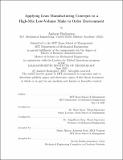Applying Lean Manufacturing Concepts to a High-Mix Low-Volume Make to Order Environment
Author(s)
Rodriguez, Andrew
DownloadThesis PDF (10.81Mb)
Advisor
Spear, Steve
Chun, Jung-Hoon
Terms of use
Metadata
Show full item recordAbstract
Despite research documenting the operational benefits achieved by reducing the number of product offerings, manufacturing businesses frequently serve markets in which customers demand a large variety of products with options across multiple features at irregular intervals. To meet customer requirements across a range of possible demand, businesses manage the high mix and low volume by choosing to make-to-order instead of make-to-stock. While principles of Lean Manufacturing have been recognized as enablers of operational excellence in high volume production operations, questions remain about the applicability of the concepts in high-mix, low-volume, make-to-order environments.
This project explores the applicability of Lean concepts within this manufacturing environment at PSI Control Solutions (PSI), a mid-sized business assembling electrical distribution and control products for industrial consumers. To stay competitive, the business must provide high quality, cost competitive products that meet customer specifications with minimal lead times. Within this organization, the primary research areas for applying Lean concepts were component replenishment policy and production process improvement. After a production cell applied the methods of eliminating waste, mistake proofing, and pull, it increased the percent of sales delivered on time to the customer desired date from 85.7% to 100% over subsequent 3 month periods and improved product first pass-yield from 87.9% to 93.1% over 6 month periods.
Date issued
2021-06Department
Massachusetts Institute of Technology. Department of Mechanical Engineering; Sloan School of ManagementPublisher
Massachusetts Institute of Technology